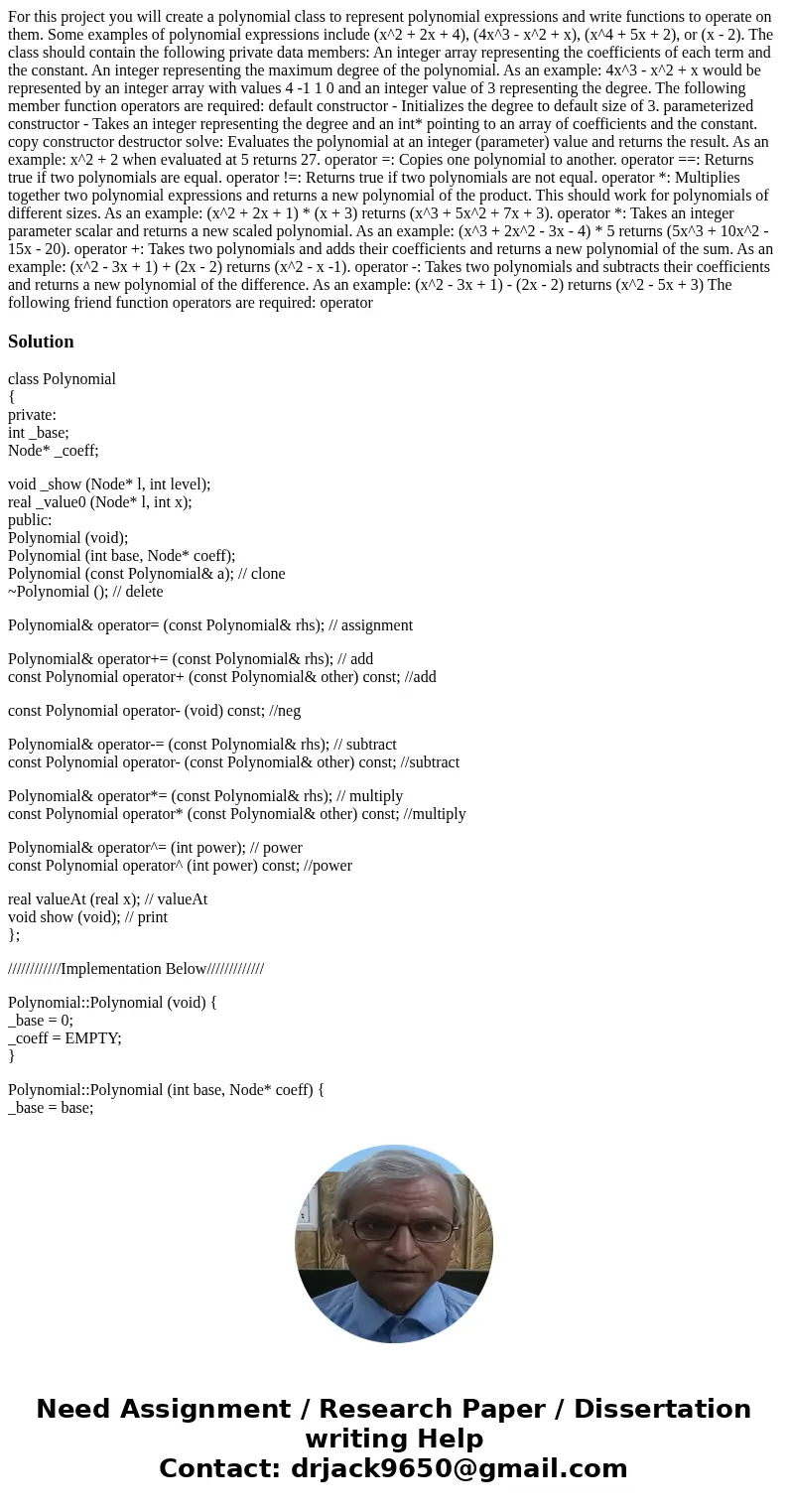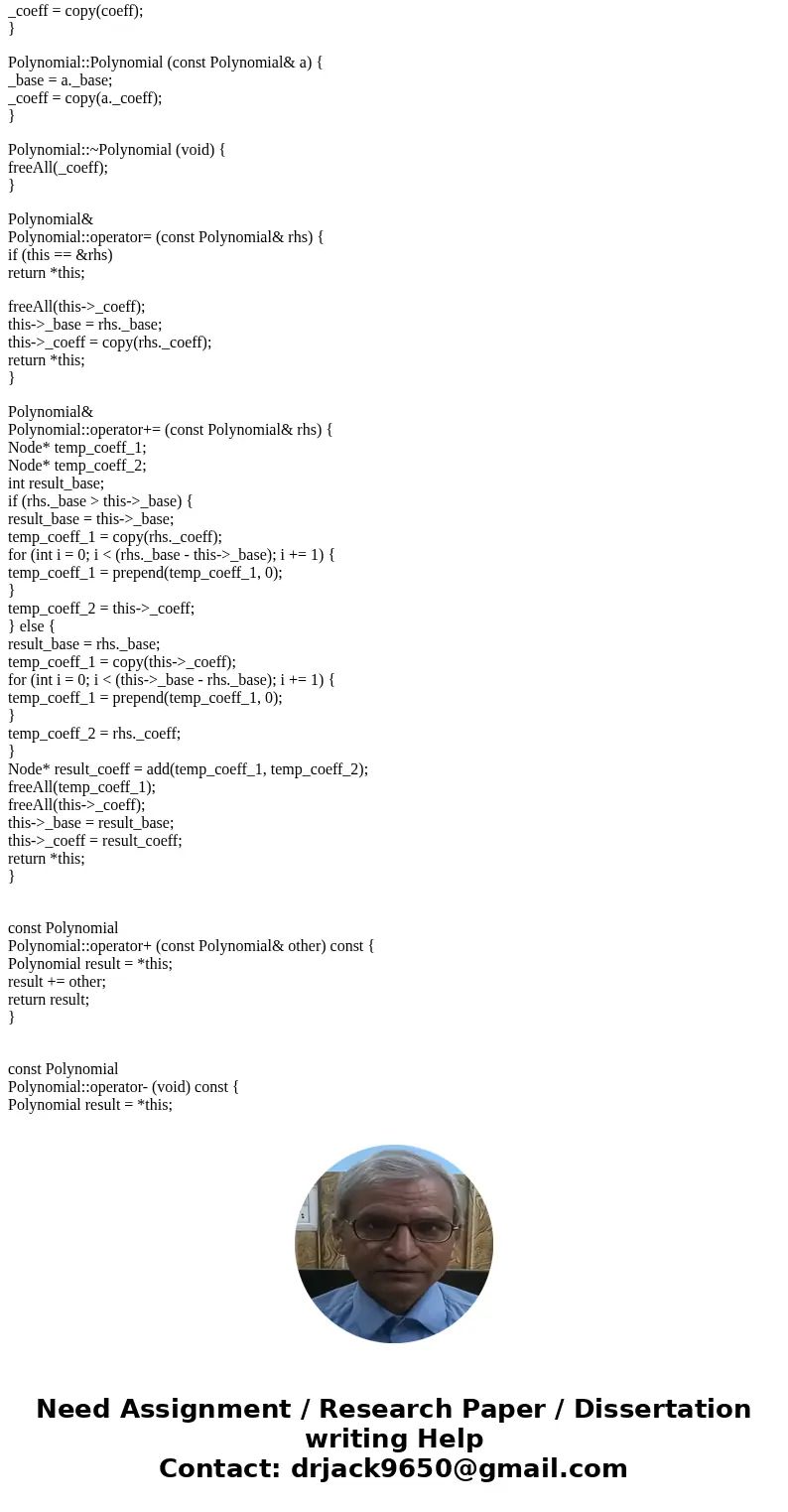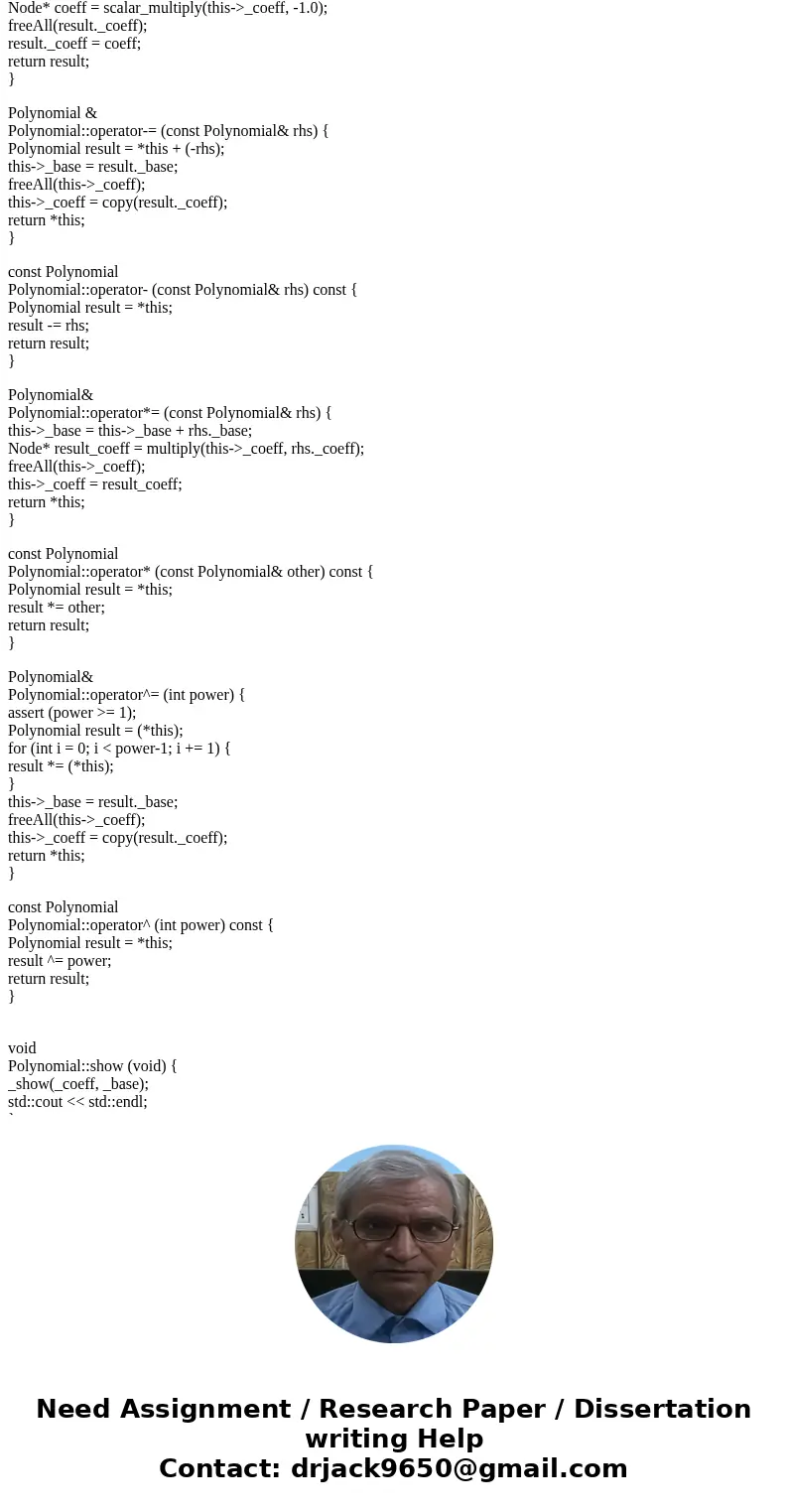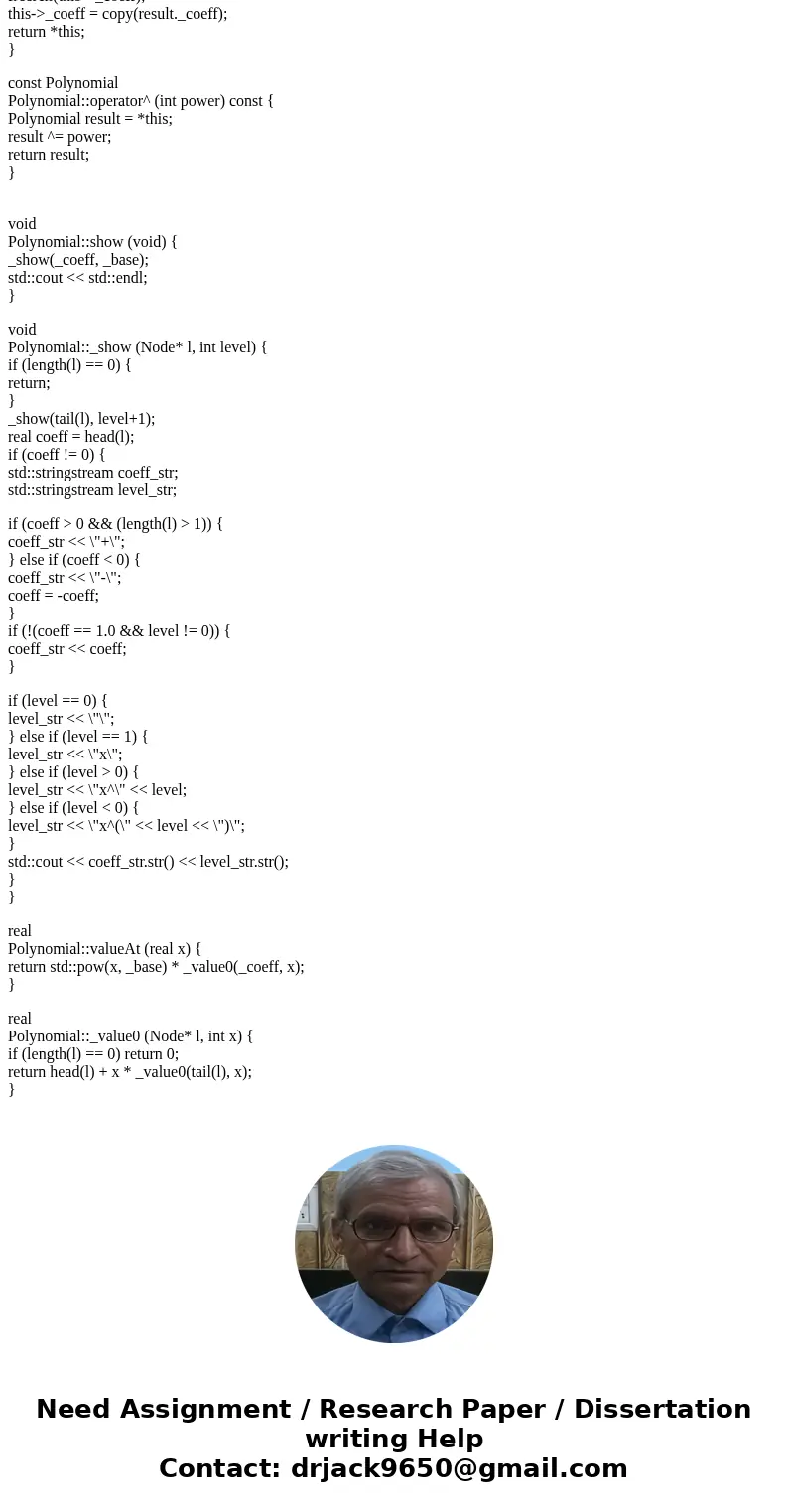For this project you will create a polynomial class to repre
Solution
class Polynomial
{
private:
int _base;
Node* _coeff;
void _show (Node* l, int level);
real _value0 (Node* l, int x);
public:
Polynomial (void);
Polynomial (int base, Node* coeff);
Polynomial (const Polynomial& a); // clone
~Polynomial (); // delete
Polynomial& operator= (const Polynomial& rhs); // assignment
Polynomial& operator+= (const Polynomial& rhs); // add
const Polynomial operator+ (const Polynomial& other) const; //add
const Polynomial operator- (void) const; //neg
Polynomial& operator-= (const Polynomial& rhs); // subtract
const Polynomial operator- (const Polynomial& other) const; //subtract
Polynomial& operator*= (const Polynomial& rhs); // multiply
const Polynomial operator* (const Polynomial& other) const; //multiply
Polynomial& operator^= (int power); // power
const Polynomial operator^ (int power) const; //power
real valueAt (real x); // valueAt
void show (void); // print
};
////////////Implementation Below/////////////
Polynomial::Polynomial (void) {
_base = 0;
_coeff = EMPTY;
}
Polynomial::Polynomial (int base, Node* coeff) {
_base = base;
_coeff = copy(coeff);
}
Polynomial::Polynomial (const Polynomial& a) {
_base = a._base;
_coeff = copy(a._coeff);
}
Polynomial::~Polynomial (void) {
freeAll(_coeff);
}
Polynomial&
Polynomial::operator= (const Polynomial& rhs) {
if (this == &rhs)
return *this;
freeAll(this->_coeff);
this->_base = rhs._base;
this->_coeff = copy(rhs._coeff);
return *this;
}
Polynomial&
Polynomial::operator+= (const Polynomial& rhs) {
Node* temp_coeff_1;
Node* temp_coeff_2;
int result_base;
if (rhs._base > this->_base) {
result_base = this->_base;
temp_coeff_1 = copy(rhs._coeff);
for (int i = 0; i < (rhs._base - this->_base); i += 1) {
temp_coeff_1 = prepend(temp_coeff_1, 0);
}
temp_coeff_2 = this->_coeff;
} else {
result_base = rhs._base;
temp_coeff_1 = copy(this->_coeff);
for (int i = 0; i < (this->_base - rhs._base); i += 1) {
temp_coeff_1 = prepend(temp_coeff_1, 0);
}
temp_coeff_2 = rhs._coeff;
}
Node* result_coeff = add(temp_coeff_1, temp_coeff_2);
freeAll(temp_coeff_1);
freeAll(this->_coeff);
this->_base = result_base;
this->_coeff = result_coeff;
return *this;
}
const Polynomial
Polynomial::operator+ (const Polynomial& other) const {
Polynomial result = *this;
result += other;
return result;
}
const Polynomial
Polynomial::operator- (void) const {
Polynomial result = *this;
Node* coeff = scalar_multiply(this->_coeff, -1.0);
freeAll(result._coeff);
result._coeff = coeff;
return result;
}
Polynomial &
Polynomial::operator-= (const Polynomial& rhs) {
Polynomial result = *this + (-rhs);
this->_base = result._base;
freeAll(this->_coeff);
this->_coeff = copy(result._coeff);
return *this;
}
const Polynomial
Polynomial::operator- (const Polynomial& rhs) const {
Polynomial result = *this;
result -= rhs;
return result;
}
Polynomial&
Polynomial::operator*= (const Polynomial& rhs) {
this->_base = this->_base + rhs._base;
Node* result_coeff = multiply(this->_coeff, rhs._coeff);
freeAll(this->_coeff);
this->_coeff = result_coeff;
return *this;
}
const Polynomial
Polynomial::operator* (const Polynomial& other) const {
Polynomial result = *this;
result *= other;
return result;
}
Polynomial&
Polynomial::operator^= (int power) {
assert (power >= 1);
Polynomial result = (*this);
for (int i = 0; i < power-1; i += 1) {
result *= (*this);
}
this->_base = result._base;
freeAll(this->_coeff);
this->_coeff = copy(result._coeff);
return *this;
}
const Polynomial
Polynomial::operator^ (int power) const {
Polynomial result = *this;
result ^= power;
return result;
}
void
Polynomial::show (void) {
_show(_coeff, _base);
std::cout << std::endl;
}
void
Polynomial::_show (Node* l, int level) {
if (length(l) == 0) {
return;
}
_show(tail(l), level+1);
real coeff = head(l);
if (coeff != 0) {
std::stringstream coeff_str;
std::stringstream level_str;
if (coeff > 0 && (length(l) > 1)) {
coeff_str << \"+\";
} else if (coeff < 0) {
coeff_str << \"-\";
coeff = -coeff;
}
if (!(coeff == 1.0 && level != 0)) {
coeff_str << coeff;
}
if (level == 0) {
level_str << \"\";
} else if (level == 1) {
level_str << \"x\";
} else if (level > 0) {
level_str << \"x^\" << level;
} else if (level < 0) {
level_str << \"x^(\" << level << \")\";
}
std::cout << coeff_str.str() << level_str.str();
}
}
real
Polynomial::valueAt (real x) {
return std::pow(x, _base) * _value0(_coeff, x);
}
real
Polynomial::_value0 (Node* l, int x) {
if (length(l) == 0) return 0;
return head(l) + x * _value0(tail(l), x);
}




 Homework Sourse
Homework Sourse